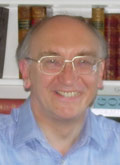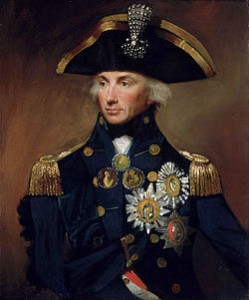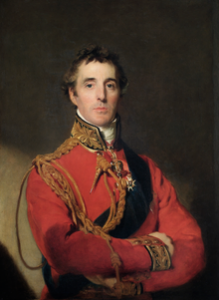
When I realised that it was my turn to write the blog and the subject was history I was filled with dread because it was my weakest subject at school. However I was grabbed by the presentation given by Professor Collins. His subject is modern history and he has written many books on the subject. His place of work is the Sheffield Hallam University and his talk was a comparison of the lives and careers of two “English” heroes in the Napoleonic Wars, namely The Duke of Wellington and Admiral Lord Nelson. The word English is in quotes because in actual fact the Duke of Wellington was Irish.
I am not going to real off any dates because they went completely over my head, but these two men were heroes in the Napoleonic Wars. The Duke of Wellington’s career was in the army and, as everybody knows Nelson’s career was in the Royal Navy.
Nelson’s family were from the clergy and his uncle was a sea captain which gave him his introduction into the the Royal Navy. The Duke of Wellington, or Arthur Wellesley as he was called was born into an aristocratic, Irish family and part of his education and training was obtained at the French Royal Academy of Equitation, where he became a first class horseman and learnt to speak French fluently. He was gazetted into the army as an ensign by the 4th Duke of Rutland (Lord Lieutenant of Ireland) and reached the rank of Lieutenant by the time he was 21.
Nelson’s uncle was chairman of the board and he used his uncle’s influence to get on many ships so that by the age of 20 he had sailed extensively. He went to the Caribbean and the death rate was high, resulting in him being promoted to captain by the age of 20. He was a very enthusiastic officer which guaranteed his career and whilst he was in the West Indies he married an affluent widow. He craved for action and was driven by glory. He was noted for his inspirational leadership, superb grasp of strategy and unconventional tactics.

During his career he spent many years at sea but only fought about five battles.
• The Battle of Cape St Vincent, which he won.
• The Battle of Santa Cruz de Tenerife, where he was defeated and lost his right arm.
• The Battle of The Nile against the French, which was a decisive victory.
• The Battle of Copenhagen against the Danes which he won.
• The Battle of Trafalgar in which he was fatally wounded and died after the victory.
Wellington’s first taste of war was under the command of the Duke of York and it was a very bad experience due to the bundling of the senior officers but as Wellington said, that was where he learned what not to do. He had an exemplary battle record and participated in over 60 campaigns during the course of his career. He was famous for his adaptive defensive style of warfare which gave him victory over foes that had numerically superior forces with the minimum of losses on his side.

The two men only met once and that was in an outer office 7 weeks before the battle of Trafalgar. Nelson was 11 years older than Wellington and the conversation was totally one sided. He went into the inner office and asked who the young officer was outside and he then returned and carried on the conversation, but this time on equal terms. Wellington never saw him again because Nelson was killed seven weeks later at Trafalgar.
Nelson died at the age of 47, a hero and Wellington carried on to be a politician and a statesman and died at the age of 84. Nelson was famous for the Battle of Trafalgar and Wellington was famous for the Battle of Waterloo. I just wonder, if Nelson had lived on into his 80s and if Wellington had died at Waterloo at the age of 46, would we have Waterloo Square and Wellington’s Column?
If you would like more details about these two heroes and Professor Bruce Collins you can find them by clicking on their photographs.
It was a very enjoyable and educational morning and I look forward to another talk by the professor.
